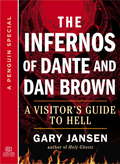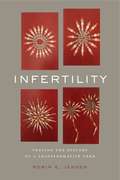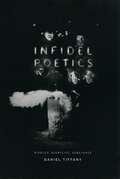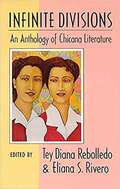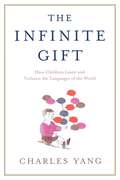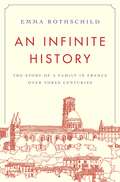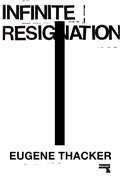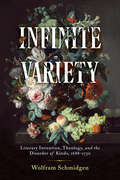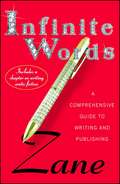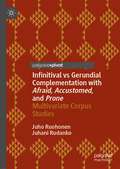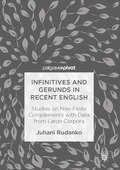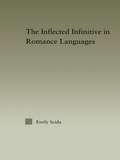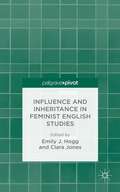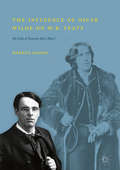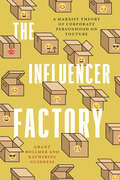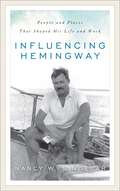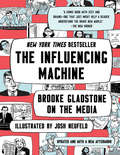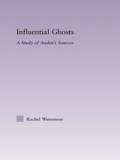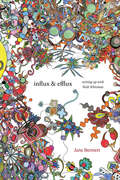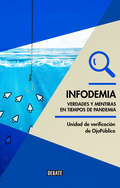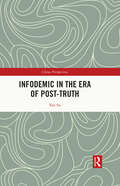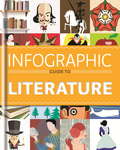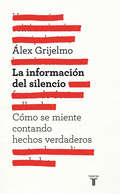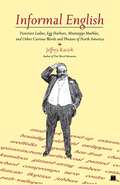- Table View
- List View
The Infernos of Dante and Dan Brown
by Gary JansenAn extraordinary journey into the signs and symbols behind Dan Brown's new Robert Langdon thriller, Inferno. Just in time for Dan Brown's new novel, this short guide introduces readers to Dante Alighieri's fourteenth-century epic poem Inferno and explores how Brown uses Dante's imagery and symbols in his latest Robert Langdon thriller. The Infernos of Dante and Dan Brown: A Visitor's Guide to Hell answers the questions and illuminates the facts behind Brown's historical puzzles, cryptic clues, and plot twists. It allows every reader to immerse himself more deeply into Robert Langdon's world. Author Gary Jansen is an independent scholar of Dante's work and a critically acclaimed writer on modern religion. In addition to providing an inside perspective on how Dan Brown uses the uncanny and remarkable themes of Dante, Jansen presents a reliable and engaging overview of the Middle Ages poet and his work. The Infernos of Dante and Dan Brown is an all-around resource into the religious themes, historical secrets, and beguiling imagery behind this breathtaking new thriller.
Infertility: Tracing the History of a Transformative Term (RSA Series in Transdisciplinary Rhetoric #3)
by Robin E. JensenThis book explores the arguments, appeals, and narratives that have defined the meaning of infertility in the modern history of the United States and Europe. Throughout the last century, the inability of women to conceive children has been explained by discrepant views: that women are individually culpable for their own reproductive health problems, or that they require the intervention of medical experts to correct abnormalities. Using doctor-patient correspondence, oral histories, and contemporaneous popular and scientific news coverage, Robin Jensen parses the often thin rhetorical divide between moralization and medicalization, revealing how dominating explanations for infertility have emerged from seemingly competing narratives. Her longitudinal account illustrates the ways in which old arguments and appeals do not disappear in the light of new information, but instead reemerge at subsequent, often seemingly disconnected moments to combine and contend with new assertions.Tracing the transformation of language surrounding infertility from “barrenness” to “(in)fertility,” this rhetorical analysis both explicates how language was and is used to establish the concept of infertility and shows the implications these rhetorical constructions continue to have for individuals and the societies in which they live.
Infidel Poetics: Riddles, Nightlife, Substance
by Daniel TiffanyPoetry has long been regarded as the least accessible of literary genres. But how much does the obscurity that confounds readers of a poem differ from, say, the slang that seduces listeners of hip-hop? Infidel Poetics examines not only the shared incomprensibilities of poetry and slang, but poetry's genetic relation to the spectacle of underground culture. Charting connections between vernacular poetry, lyric obscurity, and types of social relations—networks of darkened streets in preindustrial cities, the historical underworld of taverns and clubs, the subcultures of the avant-garde—Daniel Tiffany shows that obscurity in poetry has functioned for hundreds of years as a medium of alternative societies. For example, he discovers in the submerged tradition of canting poetry and its eccentric genres—thieves’ carols, drinking songs, beggars’ chants—a genealogy of modern nightlife, but also a visible underworld of social and verbal substance, a demimonde for sale. Ranging from Anglo-Saxon riddles to Emily Dickinson, from the icy logos of Parmenides to the monadology of Leibniz, from Mother Goose to Mallarmé, Infidel Poetics offers an exhilarating account of the subversive power of obscurity in word, substance, and deed.
Infinite Conversation (Theory and History of Literature #82)
by Maurice BlanchotIn this landmark volume, Blanchot sustains a dialogue with a number of thinkers whose contributions have marked turning points in the history of Western thought and have influenced virtually all the themes that inflect the contemporary literary and philosophical debate today. &“Blanchot waits for us still to come, to be read and reread. . . I would say that never as much as today have I pictured him so far ahead of us.&” Jacques Derrida
Infinite Divisions: An Anthology Of Chicana Literature
by Tey Diana Rebolledo Eliana S. RiveroGiven the explosive creativity shown by Chicana writers over the past two decades, this first major anthology devoted to their work is a major contribution to American letters. It highlights the key issues, motifs, and concerns of Mexican American women from 1848 to the present, and particularly reflects the modern Chicana's struggle for identity. Among the recurring themes in the collection is a re-visioning of foremothers such as the historical Malinche, the mythical Llorona, and pioneering women who settled the American Southwest from the sixteenth to twentieth centuries. Also included are historical documents on the lives, culture, and writings of Mexican American women in the nineteenth century, as well as oral histories recorded by the Federal Writers Project in the 1930s. Through poetry, fiction, drama, essay, and other forms, this landmark volume showcases the talents of more than fifty authors, including Gloria E. Anzaldúa, Ana Castillo, Lorna Dee Cervantes, Denise Chávez, Sandra Cisneros, Pat Mora, Cherríe Moraga, and María Helena Viramontes.
The Infinite Gift: How Children Learn and Unlearn the Languages of the World
by Charles YangA child's very first word is a miraculous sound, the opening note in a lifelong symphony. Most parents never forget the moment. But that first word is soon followed by a second and a third, and by the age of three, children are typically learning ten new words every day and speaking in complete sentences. The process seems effortless, and for children, it is. But how exactly does it happen? How do children learn language? And why is it so much harder to do later in life?Drawing on cutting-edge developments in biology, neurology, psychology, and linguistics, Charles Yang's The Infinite Gift takes us inside the astonishingly complex but largely subconscious process by which children learn to talk and to understand the spoken word. Yang illuminates the rich mysteries of language: why French newborns already prefer the sound of French to English; why baby-talk, though often unintelligible, makes perfect linguistic sense; why babies born deaf still babble -- but with their hands; why the grammars of some languages may be evolutionarily stronger than others; and why one of the brain's earliest achievements may in fact be its most complex. Yang also puts forth an exciting new theory. Building on Noam Chomsky's notion of a universal grammar -- the idea that every human being is born with an intuitive grasp of grammar -- Yang argues that we learn our native languages in part by unlearning the grammars of all the rest. This means that the next time you hear a child make a grammatical mistake, it may not be a mistake at all; his or her grammar may be perfectly correct in Chinese or Navajo or ancient Greek. This is the brain's way of testing its options as it searches for the local and thus correct grammar -- and then discards all the wrong ones. And we humans, Yang shows, are not the only creatures who learn this way. In fact, learning by unlearning may be an ancient evolutionary mechanism that runs throughout the animal kingdom. Thus, babies learn to talk in much the same way that birds learn to sing. Enlivened by Yang's experiences with his own young son, The Infinite Gift is as charming as it is challenging, as thoughtful as it is thought-provoking. An absorbing read for parents, educators, and anyone who has ever wondered about the origins of that uniquely human gift: our ability to speak and, just as miraculous, to understand one another.
An Infinite History: The Story of a Family in France over Three Centuries
by Emma RothschildAn innovative history of deep social and economic changes in France, told through the story of a single extended family across five generationsMarie Aymard was an illiterate widow who lived in the provincial town of Angoulême in southwestern France, a place where seemingly nothing ever happened. Yet, in 1764, she made her fleeting mark on the historical record through two documents: a power of attorney in connection with the property of her late husband, a carpenter on the island of Grenada, and a prenuptial contract for her daughter, signed by eighty-three people in Angoulême. Who was Marie Aymard? Who were all these people? And why were they together on a dark afternoon in December 1764? Beginning with these questions, An Infinite History offers a panoramic look at an extended family over five generations. Through ninety-eight connected stories about inquisitive, sociable individuals, ending with Marie Aymard’s great-great granddaughter in 1906, Emma Rothschild unfurls an innovative modern history of social and family networks, emigration, immobility, the French Revolution, and the transformation of nineteenth-century economic life.Rothschild spins a vast narrative resembling a period novel, one that looks at a large, obscure family, of whom almost no private letters survive, whose members traveled to Syria, Mexico, and Tahiti, and whose destinies were profoundly unequal, from a seamstress living in poverty in Paris to her third cousin, the cardinal of Algiers. Rothschild not only draws on discoveries in local archives but also uses new technologies, including the visualization of social networks, large-scale searches, and groundbreaking methods of genealogical research.An Infinite History demonstrates how the ordinary lives of one family over three centuries can constitute a remarkable record of deep social and economic changes.
Infinite Resignation: On Pessimism
by Eugene ThackerA collection of aphorisms, fragments, and observations on philosophy and pessimism.Composed of aphorisms, fragments, and observations both philosophical and personal, Eugene Thacker’s Infinite Resignation traces the contours of pessimism, caught as it is between a philosophical position and a bad attitude. By turns melancholic, misanthropic, and tinged with gallows humor, Thacker’s writing tenuously hovers over that point at which the thought of futility becomes the futility of thought.
Infinite Variety: Literary Invention, Theology, and the Disorder of Kinds, 1688-1730
by Wolfram SchmidgenUnnerved by the upheavals of the seventeenth century, English writers including Thomas Hobbes, Richard Blackmore, John Locke, Jonathan Swift, and Daniel Defoe came to accept that disorder, rather than order, was the natural state of things. They were drawn to voluntarism, a theology that emphasized a willful creator and denied that nature embodied truth and beauty. Voluntarism, Wolfram Schmidgen contends, provided both theological framework and aesthetic license. In Infinite Variety, he reconstructs this voluntarist tradition of literary invention.Once one accepted that creation was willful and order arbitrary, Schmidgen argues, existing hierarchies of kind lost their normative value. Literary invention could be radicalized as a result. Acknowledging that the will drives creation, such writers as Blackmore and Locke inverted the rules of composition and let energy dominate structure, matter create form, and parts be valued over the whole. In literary, religious, and philosophical works, voluntarism authorized the move beyond the natural toward the deformed, the infinite, and the counterfactual.In reclaiming ontology as an explanatory context for literary invention, Infinite Variety offers a brilliantly learned analysis of an aesthetic framed not by the rise of secularism, but by its opposite. It is a book that articulates how religious belief shaped modern literary practices, including novelistic realism, and one that will be of interest to anyone who thinks seriously about the relationship between literature, religion, and philosophy.
Infinite Words: A Comprehensive Guide to Writing and Publishing
by ZaneNew York Times bestselling author Zane shares the lessons she’s learned over the years about successful book publishing, filmmaking, and TV production.Drawing on decades of experience as a mega-bestselling novelist, successful publisher, and executive producer of two TV shows, Zane offers practical advice on writing and publishing to aspiring writers across all media, including books, TV, and film. With her signature wit and straightforward style, Zane tells it like it is, emphasizing hard work, discipline, and commitment as the keys to a successful writing career. Part One covers the writing and creative process, including how to define your writing style, how to outline a story, how to develop characters, typical mistakes to avoid, writing for your medium, and the revision process. Part Two covers the book publishing process, from finding a literary agent who best understands your work, to getting your work in the hands of publishers, to building an audience for your work. Zane also shares wisdom from her early years as a self-published author for those seeking an alternative to traditional publishing. Infinite Words isn’t just a reference guide; it’s an essential companion for writers facing the unique challenges and opportunities of today’s ever-evolving world.
Infinitival vs Gerundial Complementation with Afraid, Accustomed, and Prone: Multivariate Corpus Studies
by Juho Ruohonen Juhani RudankoThis book explores the concept of complementation in the adjectival domain of English grammar. Alternation between non-finite complements, especially to infinitives and gerundial complements, has been investigated intensively on the basis of large corpora in the last few years. With very few exceptions, however, such work has hitherto been based on univariate analysis methods. Using multivariate analysis, the authors present methodologically innovative case studies examining a large array of explanatory factors potentially impacting complement choice in cases of alternation. This approach yields more precise information on the impact of each factor on complement choice as well as on interactions between different explanatory factors. The book thus presents a methodologically new perspective on the study of the system of non-finite complementation in recent English and variation within that system, and will be relevant to academics and students with an interest in English grammar, predicate complementation, and statistical approaches to language.
Infinitives and Gerunds in Recent English
by Juhani RudankoThis book explores the grammar of to infinitives and gerundial -ing clauses, which is a central area at the interface of syntax and semantics, against the background of what has been called the Great Complement Shift. Over the course of six chapters, the author explores the semantic properties of constructions where the general spread of gerundial -ing clauses occurs at the expense of to infinitives. The author draws on large electronic corpora, ensuring that new perspectives are opened on the basis of authentic corpus evidence. He identifies trends of variation and change in the use of the two constructions and proposes The Choice Principle, an innovative perspective on the semantics of to infinitives and gerundial -ing complements. This book will be of interest to researchers and students working on English grammar or the recent history of English grammar.
The Inflected Infinitive in Romance Languages (Outstanding Dissertations in Linguistics)
by Emily E. ScidaThis book investigates two prominent issues with regard to the inflected infinitive-the syntactic distribution of the Portuguese inflected infinitive, and its origin and development from Early Romance. The syntactic analysis offered here differs from traditional descriptions of the inflected infinitive in that it uses a theoretical approach to propose one concise condition which predicts all possible occurrences of the Portuguese inflected infinitive within the framework of relational grammar. While the first section of this book offers a synchronic study of the use of the inflected infinitive, the second section examines the theories previously posited to explain its origin and provides additional evidence from Latin and other Romance languages to support the proposal that the inflected infinitive was a historical development rooted in the Latin imperfect subjunctive. This study presents a detailed comparison of the syntactic environments common to both the imperfect subjunctive and the inflected infinitive, and examines the survival of an inflected infinitive in other Romance varieties as well as the existence of other inflected non-finite forms in these languages.
Influence and Inheritance in Feminist English Studies
by Emily J. Hogg Clara JonesThis collection explores how new directions in feminist literary study might be informed by the work of the past. It offers a snapshot view of new feminist research in the field today and traces the influence of the substantial feminist inheritance in English Studies through six distinct, individual pieces of rigorous and innovative new work.
The Influence of Oscar Wilde on W.B. Yeats: "An Echo of Someone Else’s Music"
by Noreen DoodyThis book asserts that Oscar Wilde (1854 – 1900) was a major precursor of W.B. Yeats (1865 – 1939), and shows how Wilde’s image and intellect set in train a powerful influence within Yeats’s creative imagination that remained active throughout the poet’s life. The intellectual concepts, metaphysical speculations and artistic symbols and images which Yeats appropriated from Wilde changed the poet’s perspective and informed the imaginative system of beliefs that Yeats formulated as the basis of his dramatic and poetic work.Section One, 'Influence and Identity' (1888 – 1895), explores the personal relationship of these two writers, their nationality and historical context as factors in influence. Section Two, 'Mask and Image' (1888 – 1917), traces the creative process leading to Yeats’s construction of the antithetical mask, and his ideas on image, in relation to the role of Wilde as his precursor. Finally, 'Salomé: Symbolism, Dance and Theories of Being' (1891 – 1939) concentrates on the immense influence that Wilde’s symbolist play, Salomé, wrought on Yeats’s imaginative work and creative sensibility.
The Influencer Factory: A Marxist Theory of Corporate Personhood on YouTube
by Grant Bollmer Katherine GuinnessInfluencers are more than social media personalities who attract attention for brands, argue Grant Bollmer and Katherine Guinness. They are figures of a new transformation in capitalism, in which the logic of the self is indistinguishable from the logic of the corporation. Influencers are emblematic of what Bollmer and Guinness call the "Corpocene": a moment in capitalism in which individuals achieve the status of living, breathing, talking corporations. Behind the veneer of leisure and indulgence, most influencers are laboring daily, usually for pittance wages, to manufacture a commodity called "the self"—a raw material for brands to use—with the dream of becoming corporations in human form by owning and investing in the products they sell. Refuting the theory that digital labor and economies are immaterial, Bollmer and Guinness search influencer content for evidence of the material infrastructure of capitalism. Each chapter looks to what literally appears in the backgrounds of videos and images: the houses, cars, warehouses, and spaces of the market that point back to the manufacturing and circulation of consumer goods. Demonstrating the material reality of producing the self as a commodity, The Influencer Factory makes a crucial contribution to our understanding of contemporary economic life.
Influencing Hemingway: People and Places That Shaped His Life and Work
by Nancy W SindelarErnest Hemingway embraced adventure and courted glamorous friends while writing articles, novels, and short stories that captivated the world. Hemingway’s personal relationships and experiences influenced the content of his fiction, while the progression of places where the author chose to live and work shaped his style and rituals of writing. Whether revisiting the Italian front in A Farewell to Arms, recounting a Pamplona bull run in The Sun Also Rises, or depicting a Cuban fishing village in The Old Man and the Sea, setting played an important part in Hemingway’s fiction. The author also drew on real people—parents, friends, and fellow writers, among others—to create memorable characters in his short stories and novels. In Influencing Hemingway: The People and Places That Shaped His Life and Work Nancy W. Sindelar introduces the reader to the individuals who played significant roles in Hemingway’s development as both a man and as an artist—as well as the environments that had a profound impact on the a
The Influencing Machine (Updated Edition): Brooke Gladstone On The Media
by Brooke Gladstone Josh NeufeldNew York Times Bestseller With a New Afterword “A comic book with zest and brains—one that just might help a reader understand the brave new world.” —The New Yorker A million listeners trust NPR’s Brooke Gladstone to guide them through the complexities of the modern media. Bursting onto the page in vivid comics by acclaimed artist Josh Neufeld, this brilliant radio personality guides us through two millennia of media history, debunking the notion that “The Media” is an external force beyond our control and equipping us to be savvy consumers and shapers of the news. An invaluable introduction to how the media works from one of the acknowledged masters of the industry, this tenth anniversary edition brings the story up to date, with new illustrations and an afterword that offers a deep examination of the rise of social media and the public’s responsibility in a time of division and disinformation.
Influential Ghosts: A Study of Auden's Sources (Studies in Major Literary Authors)
by Rachel WetzsteonInfluential Ghosts: A Study of Auden's Sources explores some of the most important literary and philosophical influences on W.H. Auden's poetry. The study attempts to show that Auden's poetry derives much of its interest from the vast range of authors on whom he drew for inspiration. But it also suggest that his relationship to these writers was marked by a fascinating ambivalence.In chapters on Auden's relationship to Hardy and Kierkegaard, the study shows how, after lovingly apprenticing himself to their work and often borrowing stylistic or thematic features from it - Hardy's sweeping "hawk's vision," Kierkegaard's urgent "leap of faith" - he began to criticize the very things he had previously striven to emulate. In a chapter on Auden's elegies, the author argues that, alone among examples of this poetic genre, they both reverently mourn and harshly scrutinize their subjects (Yeats, Freud, Henry James and others). In a chapter on "structural allusion" in Auden's early poetry, the study posits that Auden singlehandedly invented a new kind of allusion in which he alludes to the form and subject matter of entire poems. But while doing so, he also finds fault with the attitudes (passivity, despair) depicted in them. In these structurally allusive poems - as with his relationship to Hardy, Kierkegaard and his elegies' subjects - Auden's sometimes accepting, sometimes skeptical attitude toward his poetic models is on powerful display, and finds a perfect counterpart in the tension between imitative form and critical content.
Influx and Efflux: Writing Up with Walt Whitman
by Jane BennettIn influx & efflux Jane Bennett pursues a question that was bracketed in her book Vibrant Matter: how to think about human agency in a world teeming with powerful nonhuman influences? “Influx & efflux”—a phrase borrowed from Whitman's "Song of Myself"—refers to everyday movements whereby outside influences enter bodies, infuse and confuse their organization, and then exit, themselves having been transformed into something new. How to describe the human efforts involved in that process? What kinds of “I” and “we” can live well and act effectively in a world of so many other lively materialities? Drawing upon Whitman, Thoreau, Caillois, Whitehead, and other poetic writers, Bennett links a nonanthropocentric model of self to a radically egalitarian pluralism and also to a syntax and style of writing appropriate to the entangled world in which we live. The book tries to enact the uncanny process by which we “write up” influences that pervade, enable, and disrupt us.
Infodemia: Mentiras y verdades en tiempos de pandemia
by OjoPúblico .Un e-book que investiga y esclarece las falsas informaciones nacidas en tiempos de pandemia El equipo de investigación de OjoPúblico presenta en este e-book un análisis minucioso de la información difundida en los medios de comunicación y las redes sociales sobre los impactos del COVID-19 para evitar la propagación de la desinformación que contamina a todos los peruanos y peruanas. Gracias al ejercicio del Factchecking, OjoPúblico logra desbaratar las noticias falsas y las contrapone con información verídica y data comprobada para evitar que las Fakenews sean la próxima pandemia.
Infodemic in the Era of Post-Truth (China Perspectives)
by Yan SuWith the revolution in information technology, concerns about the proliferation of false, unverified, and misleading information have been growing. As one of the severe public health crises in modern history, the COVID-19 pandemic has provided a novel context for the "post-truth" research. In a "post-truth" era, people are no longer interested in investigating objective facts, but tend to curl up in echo chambers and resonate with like-minded others. Against this backdrop, this book (1) systematically conceptualises "post-truth" and analyzes its defining characteristics and driving forces, (2) examines the nuanced effects of information sources and news consumption behaviours and strategies on COVID-19 misperceptions and knowledge, (3) explores the role of social media in shaping COVID-19-related misperceptions and knowledge, and (4) highlights the importance of news media literacy in navigating the "post-truth" era. The book will be essential reading for students and scholars of media and film studies, communication studies and comparative studies. It will also be a useful reference for medical and media professionals such as doctors, nurses and journalists.
Infographic Guide to Literature (Infographic Guides)
by Joanna Eliot100 stunning, ingenious and absorbing infographics all about literature, featuring your favourite books and authors!Infographic Guide to Literature presents unique, witty and surprising facts about literature, from Shakespeare and Austen to Nabakov and Orwell, to George R. R. Martin and E. L. James. Fascinating stats and all the facts on your favourite writers, poets and playwrights, it features infamous tales from behind the scenes of the literary world.This book celebrates the power of words with graphs, Venn diagrams and charts, this book provides a unique overview of your favourite figures in literature, boasting over 100 original artworks and illustrations and at-a-glance facts to amaze and astound readers.Brilliant infographics include:War Words: The conflicts and the writers who fought, wrote and perished in them across timeline and geography 100 Years of Family: The family tree of Garcia Marquez's huge novel tracedShakespeare Eternal: Seven key plays and their rewrite in different genres, including crime, chick-lit, thriller, comedy, Adult, YA and literaryBanned Books: timeline and location of titles that have and continue to be banned in different countries
La información del silencio: Cómo se miente contando hechos reales
by Álex GrijelmoUna aportación innovadora a la ética de la información: en este libro se demuestra que el silencio también habla. «Anoche fue encontrado el cadáver de Eustasio Peláez en una calle del polígono industrial C-40. Momentos antes se había visto por el lugar a Higinio Gurméndez, con el que tenía un litigio por unas tierras». Puede ocurrir que esos dos hechos sean ciertos, y que sin embargo se derive de ellos una interpretación falsa. Porque el lector entenderá algo que no se ha dicho... pero se ha querido decir. ¿Qué debe hacer un juez en un caso así? ¿Se puede condenar a un periodista por contar hechos verdaderos? Álex Grijelmo ha escrito ya siete libros sobre periodismo y sobre divulgación lingüística, pero éste es distinto de los anteriores. En La información del silencio, no se trata tanto de introducir al lector en el conocimiento del mundo de la lengua #aunque ese propósitotambién se consigue# como de construir una teoría sólida sobre las manipulaciones informativas basadas en trucos de silencio: esa forma de decir callando, de contar medias verdades. Tras un recorrido lleno de ejemplos para explicar los significados del silencio tanto en el cine como en la literatura, en la retórica, en la música..., la obra se centra en la rama de la lingüística conocida como pragmática, que estudia el sentido de lo que decimos más allá de su significado. Y edifica así un armazón teórico para aplicarlo en los últimos capítulos, referidos ya al periodismo y a sus trampas. Este libro constituye, por tanto, una aportación innovadora a la ética de la información, porque demuestra que el silencio también habla, y que el silencio puede mentir; y que los jueces no lo escuchan.
Informal English: Puncture Ladies, Egg Harbors, Mississippi Marbles, and Other Curious Words and Phrases of North America
by Jeffrey KacirkGleaned from antiquated dictionaries, dialect glossaries, studies of folklore, nautical lexicons, historical writings, letters, novels, and miscellaneous sources, Informal English offers a captivating treasure trove of linguistic oddities that will not only entertain but also shed light on America's colloquial past. Among the gems are: Surface-coal: cow dung, widely used for fuel in Texas Bone-orchard: in the Southwest slang for a cemetery Chawswizzled: "confounded" in Nebraskan idiom. "I'll be chawswizzled!" Leather-ears: to Cape Cod inhabitants, a person of slow comprehension Puncture lady: a southwestern expression for a woman who prefers to sit on the sidelines at a dance and gossip rather than dance, often puncturing someone's reputation Whether the entries are unexpected twists on familiar-sounding expressions or based on curious old customs, this wide-ranging assortment of vernacular Americanisms will amaze and amuse even the most hard-boiled curmudgeon.
